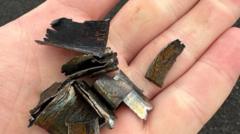The rising incidence of grave theft in Morogoro, Tanzania, has left families devastated as robbers target crosses and grave markers for scrap metal. With more than 250 graves vandalized in one cemetery, local authorities and community leaders are becoming increasingly concerned over the moral and ethical implications behind these acts, driven by economic desperation.
Desecration of Graves in Tanzania: A Deepening Crisis Spurred by Scrap Metal Theft

Desecration of Graves in Tanzania: A Deepening Crisis Spurred by Scrap Metal Theft
In Morogoro, Tanzania, a distressing trend emerges as grave sites fall victim to theft, driven by rising demand for scrap metals. Families mourn the loss of not only their loved ones but now, their memorials.
In the eastern Tanzanian city of Morogoro, the haunting reality of grave desecration has taken hold, as robbers systematically strip crosses and markers from resting places in search of scrap metal. This emerging crime trend has not only left families grappling with grief but has also sparked outrage within the community. Reports indicate that over 250 graves have been targeted within a small area of the Kola Municipal Cemetery.
Pudensiana Chumbi, who has mourned at the graves of her daughter and mother for over two decades, recounts the painful experience of having both shrines vandalized and their crosses stolen. Explaining her turmoil, she revealed that after replacing her mother’s cross, soon after, it too was taken. This relentless cycle of theft creates a desperate quandary for bereaved families, many of whom feel powerless to stop the violence against sacred sites.
The thefts often occur under the cover of night, lured by the demand for scrap metal that has grown in recent years. An anonymous thief explained to BBC reporters that the process involved stealing crosses and selling them to welders who cut them into unrecognizable pieces for the scrap market. With prices averaging between 700 and 870 Tanzanian shillings (approximately $0.27 to $0.34), thieves may not reap much from their deeds, yet it is often just enough to afford a meal or drink.
Local scrap merchants have begun instituting measures to combat the sale of stolen goods, including reporting thieves to authorities. However, the demand remains, and with a recent surge in thefts, grave markers of all types have continued to fall victim.
Morogoro's health officer, Dr. Ndimile Kilatu, emphasizes the need for better security measures at cemeteries, such as fences and guards, but acknowledges that funding and resources are necessary to implement these changes. Similarly, Tanzania's Deputy Prime Minister Dotto Biteko has called for stronger regulations within the scrap metal industry to discourage the trade of stolen materials.
In an appeal for community support, Pastor Steven Msigara urged collective action to teach respect for sacred sites among the youth, aiming for a cultural return to dignity for these hallowed areas. As Ms. Chumbi prepares to replace her stolen mother's cross yet again, she advocates for increased security measures to protect the memories of loved ones and restore sanctity to the resting places that now face such desecration.
Pudensiana Chumbi, who has mourned at the graves of her daughter and mother for over two decades, recounts the painful experience of having both shrines vandalized and their crosses stolen. Explaining her turmoil, she revealed that after replacing her mother’s cross, soon after, it too was taken. This relentless cycle of theft creates a desperate quandary for bereaved families, many of whom feel powerless to stop the violence against sacred sites.
The thefts often occur under the cover of night, lured by the demand for scrap metal that has grown in recent years. An anonymous thief explained to BBC reporters that the process involved stealing crosses and selling them to welders who cut them into unrecognizable pieces for the scrap market. With prices averaging between 700 and 870 Tanzanian shillings (approximately $0.27 to $0.34), thieves may not reap much from their deeds, yet it is often just enough to afford a meal or drink.
Local scrap merchants have begun instituting measures to combat the sale of stolen goods, including reporting thieves to authorities. However, the demand remains, and with a recent surge in thefts, grave markers of all types have continued to fall victim.
Morogoro's health officer, Dr. Ndimile Kilatu, emphasizes the need for better security measures at cemeteries, such as fences and guards, but acknowledges that funding and resources are necessary to implement these changes. Similarly, Tanzania's Deputy Prime Minister Dotto Biteko has called for stronger regulations within the scrap metal industry to discourage the trade of stolen materials.
In an appeal for community support, Pastor Steven Msigara urged collective action to teach respect for sacred sites among the youth, aiming for a cultural return to dignity for these hallowed areas. As Ms. Chumbi prepares to replace her stolen mother's cross yet again, she advocates for increased security measures to protect the memories of loved ones and restore sanctity to the resting places that now face such desecration.



















